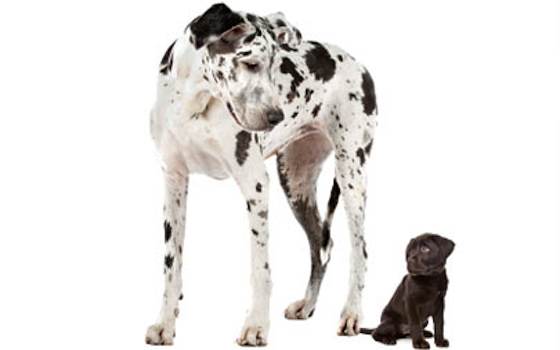- MENU
- HOME
- SEARCH
- WORLD
- MAIN
- AFRICA
- ASIA
- BALKANS
- EUROPE
- LATIN AMERICA
- MIDDLE EAST
- United Kingdom
- United States
- Argentina
- Australia
- Austria
- Benelux
- Brazil
- Canada
- China
- France
- Germany
- Greece
- Hungary
- India
- Indonesia
- Ireland
- Israel
- Italy
- Japan
- Korea
- Mexico
- New Zealand
- Pakistan
- Philippines
- Poland
- Russia
- South Africa
- Spain
- Taiwan
- Turkey
- USA
- BUSINESS
- WEALTH
- STOCKS
- TECH
- HEALTH
- LIFESTYLE
- ENTERTAINMENT
- SPORTS
- RSS
- iHaveNet.com: Pets
by Stacy Braslau-Schneck

Whether your dog is a Chihuahua or a Great Dane, Los Angeles--based veterinarian Dr. Amber Andersen figures she knows something about your pal's approach to dinner. "They're all chowhounds," says Andersen with a chuckle.
But even though most puppies share the same voracious appetite, they have unique nutritional needs, depending on their size and breed. There are several important steps you can take to make sure you're meeting your dog's unique nutritional needs:
Educate yourself.
Read up and talk to a breeder about the health issues and unique characteristics of your dog's breed.
Talk to your veterinarian.
Your veterinarian should also evaluate your puppy's development and caloric needs.
Feed your dog size- and/or breed-specific food.
"The best thing veterinarians recommend is high-quality dog food, grouped by size," explains Andersen (visit her at AnimalDrAmber.com). "Some brands will even offer foods for a specific breed," and selling breed-specific food is not some marketing gimmick, notes Andersen. "Pet food companies will modify nutritional components based on previous known issues for the breeds. They'll modify because, just like people, different dog breeds have specific dietary needs."
What Does Your Dog Need?
So what is your dog likely to need nutritionally, depending on his or her size? Here's an overview:
Small dogs:
Small-breed puppies have faster metabolisms and reach maturity quicker. This means they need higher levels of protein, fat, calcium and phosphorus to support growth and development of bones, muscles and other tissues. Moreover, their mouths and tummies are dainty, so their meals must come in the form of a petite kibble.
Medium dogs:
These breeds are -- you guessed it -- right in the middle. They'll weigh between 20 and 50 pounds as adults. Food for these breeds should have the appropriate-sized kibble and meet their unique nutritional needs. High-quality foods contain antioxidants, including beta-carotene and vitamin E for immune system strength. They also include fiber, such as beet pulp; digestible carbohydrates, such as barley and grain sorghum; and omega-6 and omega-3 fatty acids, for skin and coat health.
Large dogs:
Large-breed puppies tend to grow fast. If they're not eating the right nutrients, their developing bones can't handle the weight. Their skeletal systems bend and break, and these beautiful creatures can be hobbled for life as a result. "Large-breed puppies, or those expected to weigh more than 50 pounds as adults, should eat balanced food with controlled energy content along with calcium and phosphorus levels that have been formulated specifically for their needs," says Dr. Amy Dicke, a technical services veterinarian with Eukanuba. If you're not sure what food to get for your dog, ask your vet or breeder for recommendations.
Feeding Frequency
A St. Bernard puppy can gobble more chow in a sitting than a Yorkie can. But no matter your dog's breed, it's best to meet your puppy's caloric needs by breaking up feeding into several small meals. Andersen advises offering your puppy at least three meals a day: breakfast, lunch and dinner.
Photo: @iStockphoto.com/Eriklam
Available at Amazon.com:
AUTOS | HOBBIES | EDUCATION | FAMILY | FASHION | FOOD & RECIPES | HOME DECOR | RELATIONSHIPS | PARENTING | PETS | TRAVEL | WOMEN
PET STORIES and PET ARTICLES ...
- Is Your Dog Cut out for Field Trials?
- Should You Crate-train Your Puppy?
- How to Play Soccer With Your Dog
- The Best Way for Your Dog to Ride in the Car with You
- Good Dog Park Etiquette
- What Is Freestyle Dancing With Dogs?
- Canicross: An Easier Way to Run With Your Dog
- Reading Your Dog's Body Language
- Kitten Kindergarten
- Tips to Keep Your Dog Safe While Flying
- Keep Your Dog Warm in the Winter
- Scottish Deerhound: The Ideal Exercise Buddy
- Teach Your Dog to Fetch
- Is Your Dog Bored?
- 7 Ways to Pamper Your Cat
- The Best Games to Play With Your High-Energy Dog
- Dog Feeding Mishaps Corrected
- How to Succeed at Off-Leash Dog Play
- ID Your Relationship With Your Cat
- Photographing Your Elusive Feline
- How to Keep Your Pet Safe During the Holidays
- When Good Dogs Turn Bad
- From Finicky Fido to Chowhound Charlie
- Insure Your Kitty's Health
- Unconditional Love: My Cat Forgives Me Every Day
- From Feline to Family Member
- Is Water From a Christmas Tree Stand Harmful to Cats?
- A Day in the Life of a Sheepherding Dog
- Go on a Desert Retreat With Your Dog
- Dog Food Goes Natural and Holistic
- Determining a Food Allergy
- Exercise Gone to the Dogs
- Find the Right Sport for Your Dog
- Make Your Dog a Part of Your Wedding
- Hydrotherapy Helps Dogs Get in Shape
- How Your Cat Says 'I Love You'
- Lost Cats Found
- De-stress Veterinary Visits for Your Cat
- Keeping Cat Food Fresh
- Second-Hand Cat, First-Rate Pet
Copyright ©
Pets | Dogs: Size up Your Puppy's Food